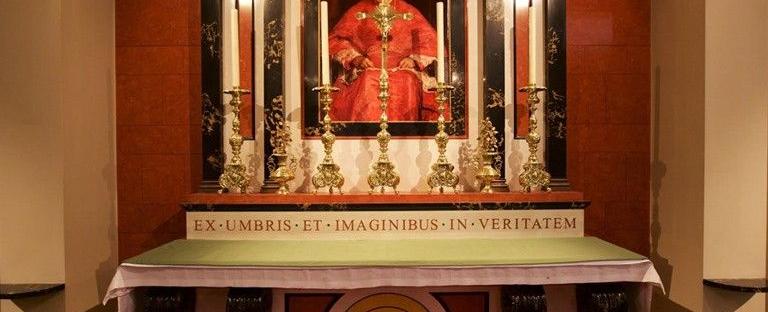The Healing of the Liturgical Imagination: The Sweet Rhetoric of John Henry Newman’s Liturgical Sermons

Dr. Timothy O'Malley presented this lecture as the keynote address for the National Institute for Newman Studies Spring 2020 Newman Symposium. The full lecture is posted at the end of the blog article.
John Henry Newman's Parochial and Plain Sermons have become integral to the evaluation of his identity as a Christian thinker. John F. Crosby, in The Personalism of John Henry Newman, frequently turns to the sermons, arguing that Newman speaks "heart to heart" through the prose of the sermons, inviting the gathered congregation to think along with him through his rhetoric.[1] In his two-volumes on the Georgian genre of Newman's Parochial and Plain Sermons, Victor J. Lambs perceives the sermons within the genre of the georgic, providing advice for living the Christian life in the context of modern English Christianity.[2] Eamon Duffy further argues that Newman saw no real distinction between his theological work and preaching in his Anglican period, often using the pulpit as a location for theological speculation.[3] The sermons are thus not peripheral but integral to Newman's theological corpus.
Yet, among those who have turned to Newman's preaching, it is rare for such persons to invoke the context of patristic rhetoric as influencing Newman's preaching. Rhetoric, as recent scholars have argued, within patristic preaching may be understood as a psychagogical re-formation of the soul, leading the person toward a pursuit of wisdom. Patristic preaching was uniquely theological, concerned not only with the communication of theological themes, but the with shaping of the Christian to both pursue and become the truth that one was contemplating. Such rhetoric included eliminating obstacles for understanding (often related to human sinfulness), directly engaging with cultural assumptions that were hostile to the Gospel, inviting the listener to dialectic thought, infusing the mind of the listener with the images of the Scriptures, and offering concrete practices or spiritual exercises that the listener might perform to shape their memory, understanding, and will according to the "saving medicine" of divine revelation.
This talk argues that Newman is taking up this "philosophical" approach to patristic preaching in the context of a modernized, increasingly secularized, English Christianity. Specifically, the liturgical sermons are ordered toward fostering a communal and real assent to the narrative of salvation. The lecture proceeds in the following steps. First, it describes the "psychagogical" content of Newman's sermons, showing how two very different sermon cycles (from Gregory of Nyssa and Augustine) perform this psychagogical, healing rhetoric. Second, the essay will show how integral liturgical knowing is to his broader project (as performed in A Grammar of Assent) of healing the epistemic critiques of Christianity. Third, the talk focuses on selected sermons of the Parochial and Plain Sermons, specifically those sermons from volumes 2, 5, and 6. These sermons move the reader/listener through the liturgical cycle of the church, inviting the kind of psychagogical reflection that forms the liturgical-sacramental imagination of the reader. Fourth, the talk concludes by describing three future directions related to Newman sermons, liturgical theology, and pastoral responses to the problem of secularization.
[1] John F. Crosby, The Personalism of John Henry Newman (Washington DC: Catholic University of America Press, 2014).
[2] Victor J. Lams, Newman's Anglican Georgic: Parochial Sermons (New York: Peter Lang, 2004).
[3] Eamon Duffy, "The Anglican Parish Sermons," in The Oxford Handbook of John Henry Newman (New York: Oxford University Press, 2018), 221–42.
Timothy O'Malley
Director of Education and Academic Director of the Notre Dame Center for Liturgy
Dr. Timothy O'Malley is Director of Education and Academic Director of the Notre Dame Center for Liturgy and is the Editor of the Church Life Journal.
QUICK LINKS

